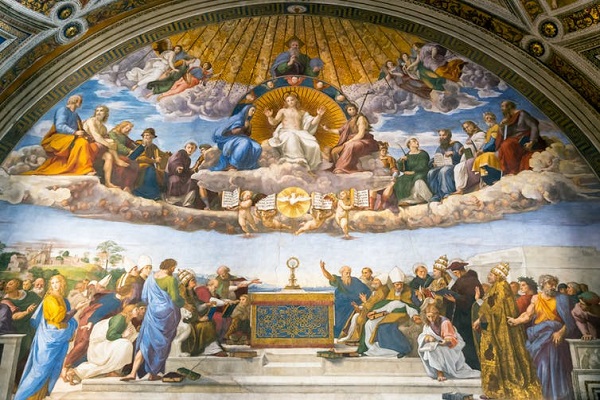When I was really young there were no Easter bunnies around our place. The idea was introduced by the teacher of the small Lutheran Day School at Downfall Creak, near Guluguba, north of Miles, west of Toowoomba, when I was about seven or eight. We did have hens eggs coloured with dye, but no chocolate at all, let alone as eggs.
However, that’s not what Easter is about. It’s about the risen Christ, right? He conquered death and rose to heaven in a cloud, to sit at the right hand of God the Almighty, with a promise to return some day. So I was interested in an article What and where is heaven? The answers are at the heart of the Easter story.
That article is by Robyn J. Whitaker, Senior Lecturer in New Testament, Pilgrim Theological College, University of Divinity, so she should know.
Before her, I decided to ask Dr Google – What actually happened when Jesus ascended into heaven?
I found that the Ascension of Jesus was a narrative of the gospel of Luke which:
- tells how Jesus leads the eleven disciples to Bethany, a village on the Mount of Olives, where he instructs them to remain in Jerusalem until the coming of the Holy Spirit: “And it came to pass, while he blessed them, he parted from them, and was carried up into heaven. And they worshiped him, and returned to Jerusalem with great joy.”
The Acts of the Apostles:
- describes a meal at which Jesus commands the disciples to await the coming of the Holy Spirit, a cloud takes him upward from sight, and two men in white appear to tell them (the disciples) that he will return “in the same way you have seen him go into heaven.”
But the author wasn’t there, and Luke and Acts were written by a man called Theophilus. We are not sure what he was up to when he wrote both books. However, the mention of Jesus disappearing into the clouds leads to this kind of problem if you are looking for heaven:

In the article we learn that 60% of Americans believe heaven is a place where people are reunited with their loved ones after death.
Whitaker tells us that when the authors were writing what became the New Testament they thought the earth was flat, that it was hot below (they got that right) and that heaven was above the blue dome they saw above them. According tp the Bible heaven was part of God’s creation, it was his home, but we could all aspire to go there after life on earth. However, Whitaker recalls:
- My pious Baptist grandmother once shockingly confessed, at the ripe old age of 93, that she didn’t want to go to heaven. “Why,” we asked? “Well, I think it will be rather boring just sitting around on clouds and singing hymns all day” she answered. She had a point.
Mark Twain might have agreed with her assessment. He once famously quipped that one should choose “heaven for the climate, hell for the company”.
Seriously though, although beliefs about heaven in the Bible are varied, complex and fluid, she discerns several lines of thought.
First, heaven was God’s dwelling:
- a place of peace, love, community, and worship, where God is surrounded by a heavenly court and other heavenly beings.

In physical nature the concept of God’s home was fleshed out by notions of paradise, which Whitaker says were influenced by Persian culture and particularly Persian Royal gardens (paridaida).
- Persian walled gardens were known for their beautiful layout, diversity of plant life, walled enclosures, and being a place where the royal family might safely walk. They were effectively a paradise on earth.
The garden of Eden in Genesis 2 is strikingly similar to a Persian Royal garden or paradise. It has abundant water sources in the rivers that run through it, fruit and plants of every kind for food, and it is “pleasing to the eye”. God dwells there, or at least visits, and talks with Adam and Eve like a King might in a royal garden.
These days paradise can take many forms, from tropical beaches to stairways into the clouds, pearly gates and golden cities. You can get a large variety of images from this site in exchange for earthly money.
However, the overall story is that humans were thrown out of the Garden of Eden for their sins, so Jesus conquering death not only brings the possibility of life ever after but a reconciliation with God. Reconciliation with God lies at the heart of the Easter story, and through the book of Revelation includes remaking our earthly existence so that peace and love prevail.
Finally:
- Heaven or paradise in the Bible is a utopian vision, designed not only to inspire faith in God but also in the hope that people might embody the values of love and reconciliation in this world.
So peace and love to everyone!
My Easter was a barbecue in the park with most of the Brisbane Bahnisch mob, with a special in-law from japasn, plus a catch-up with my eldest son at Starbucks in the city (he has a contagious disease and probably should not have left his bed). Plus tapping away here. The suburbs around here have been almost empty. Listening for sounds I could only hear a couple of crows, no cars. Everyone scarpered to the beach, the mountains, or somewhere else.
This is what our dear leader was doing for part of the time:

That image appeared on Facebook, which, of course is evil, and I think sourced from someone Twittering at #happyclappersloganbogan. I don’t quite understand how these things work. Any way she/he helpfully added:
- This is just plain weird.
Blokey Dads don’t usually sway around with their eyes closed in a state of delirium with their hands in the air babbling unintelligible gibberish… unless they’ve had way too many beers at the pub & someone slots Chisel on the jukebox.
Exactly what (or who) is our Prime Minister under the bizarre influence of?
They look like Religious Extremists in a trance-like state.
Strange days indeed. Most peculiar Scomo.
That’s not very charitable. Perhaps he’s just warming up his vocal chords for his day job:



Looking at Morrison appealing for divine inspiration or whatever, I notice he is the only person in the photo showing his arm raised. I don’t know if it is religiously significant or a metaphor for being out of sync with the congregation.
I wasn’t always a non-believer but at school when my fervent prayers to avoid being caught for no homework repeatedly went unanswered I lost confidence that He had my back.
Since then, I have not seen proof of His/Her existence although I have seen someone “talking in tongues”. And a bloke I knew fairly well described how he was slammed against a wall (by unseen forces) and right there was “spirit filled”. Neither event proved to me there was a god and my mate became a pest, always coaxing me to find the Lord.
An historical review of the atrocities committed in the name of religion or god does not help the argument for an unseen kind and merciful One either, even to this day with the turmoil in the Middle East and much more.
I made a decision to give up Christianity when I was 14 because the idea that only those that “accepted Christ as their savior” would go to heaven did not pass the fairness test. After that I spent time looking at alternative religions and thinking about morality and the meaning and mystery of existence.
In the end of this process I accepted that the mystery is a mystery that should be enjoyed and defended, that fairness is an underlying idea behind morality and that morality is about “thou shall do” as well as “thou shall not do.” All a bit vague and subject to revision in response to new experiences and thinking.
As for heaven it is a nice idea and there are some people that I would like to share heaven with. As for specifying where heaven is located in space, time and the multiverse it is anybodies guess.
I have a huge problem with everlasting life.
Do you really want to live forever, beyond the heat death of the universe? Sure, the first million years might be bearable, but by then I’m sure I’d have run out of things that interested me – and there’s still forever to go. Boring!
It seems to me that religion is an attempt to deny the reality of death (I don’t know of any exceptions). On the other hand, I’m quite comfortable with the idea that when I die I will return to wherever I was before I was born, and I’m content with the non-existence that entails.
Zoot: The ultimate aim of Buddhism is to break free of the cycle of birth and rebirth. Maybe you are not the only one who thinks everlasting life unattractive and ultimately boring.
Me I continue to find interesting things to speculate about and not enough time to do the things I want to do.
Yes John, but there’s no nirvana without samsara – in Buddhist thought we are still condemned to life (lives) after this one. I’m convinced religion arose because of our fear of death.
Me too – I’m not bored with this life. It’s the next one promised by my Methodist upbringing that I don’t fancy.
Zoot:
My guess is that fear of the dead and managing the memory of death was a bigger driving factor than fear of death.
Think about a small group where an adult who is not close up dead dies. If the group doesn’t manage the death quickly people will be too busy being disturbed by the death to stay alert to danger or put less effort into the things that help the group survive. The group has to deal with the suspicion that someone was killed by magic, preferably by finding an outsider to blame (whether human or non-human) and, if appropriate get revenge. People also have to demonstrate that they really cared by wailing, cutting their head with a rock etc. (Fred didn’t cut enough. Was Fred the one who sung the the man who died?) Then there needs to be ceremonies to help people deal with the memories quickly – our funerals help this process.
Then you have to get the spirit/memory to leave so that people can get on with their life. Think smoking ceremonies and ceremonies that encourage the spirit to go away – Helps at this stage if the spirit is connected to people who have died earlier or you can help the spirit find the isle of the dead/heaven/or…. some other place where the spirit believes it could go.
Other more societies take a different approach and try and bribe the spirit to stay around and help the living.
Excellent points John. I think we humans invented the concept of spirit because we couldn’t cope with the possibility that death means the extinction of an individual (which is actually nirvana).
Zoot: Enjoy Nirvana when you get there if you still retain a thread of self-hood that is sufficient to enjoy.
John: If, as Wikipedia informs me, Nirvana is the realisation of non-self I’m confident there will be no residual thread of self-hood.
Each night I cease to exist while I’m asleep and I have no qualms about that becoming my permanent state one day (it’s not as if I’ll be aware of it) but I would prefer it to happen later rather than sooner.
On the other hand, the prospect of living forever fills me with dread.
Mr Christopher Hitchens had an interesting viewpoint. Because he had written scathingly as a militant atheist, and (I think) been drawn to abhor Islam by the murderous Islamists and the actions of various Islamic theocracies, he often debated Christians also.
After being diagnosed with terminal cancer, people would tease him, that he may finally make a “deathbed conversion” to Christianity.
“I won’t give you that pleasure!”, with a twinkle in his eye.
Asked about fearing death, well, he saw it this way: the party would go on, but unfortunately he wouldn’t be there enjoying it.
God, I miss him.
Ambi:
Does the reference to God imply that you are not an atheist? Or is it just a figure of speech that many atheists continue to use?
A figure of speech I put in for amusement but which serves to illustrate the point made by many, that our language, thought patterns and history are steeped in religious beliefs and myths and attitudes.
Einstein spoke of humanity’s need for the transcendent. Not that his merit as a physicist should endow his opinions with prophetic authority…..
Great points and loved the Hitchens Ambi. There are a number of his debates on YouTube.
Like many, I’ve always been curious about what might be beyond end-of-life, and I’ll bet that curiosity goes back thousands of years. I reckon curiosity spawned the question and some enterprising fellows constructed a belief system that drew people in using great stories about afterlife and damnation if you were naughty.
Over time, in some societies these gatherings of believers coalesced into what we broadly call religions. Fear was a currency of recruitment, war another tool. Others sensed security I suppose. Some became extraordinarily powerful, wealthy and very influential. For example, the Catholic church.
But none can prove their history beyond dispute and none have evidence of an afterlife. It would take a good number of miracles to convince me of something waiting for me beyond the mortal coil.
Another point of view (sort of)
Zoot: Reminds me of what an EU person said to a friend of mind. “If I am right I go to heaven. If I am wrong it doesn’t matter what I believed.”
Then again……. If X is wrong he might end up in the special hell reserved for the self righteous – My interpretation of the Adam and Eve story is that the original and most terrible sin is judging others,
It is also worth noting that the main opponents of Jesus and his teachings were the Pharisees. A group that were obsessed with enforcing all the nit picking rules that can be found somewhere in the bible. (On the other hand Jesus was reported as saying “I give you one commandment – love one another.”
John
That story reminds me of Pascal’s wager:
If I believe, and God exists, I proceed to Eternal Life.
If I don’t believe, I go to the other place.
Whatever the probabilities (of God’s existence) I might as well believe; the pay off is huge, and I do mean HUGE.
***
A cynic might call the above, “the argument from self interest” (and insincere belief which any God worth his omniscience would see through). But then, I can’t hope to hazard a guess at the logic and intentions of God.
Amen
Rev. Ambi
Dear Rev Ambi: Sounds like Pascal had been convinced that the only alternatives were no god/heaven or the god of the christian establishment.
Surely there are better options than endless celibacy spent singing endless songs of praise to a god a god that appears to have serious insecurity problems that can only be treated by endless praise?
Like John, if faced with Pascal’s Wager I always ask, “Which particular God?”
I prefer Marcus Aurelius (reputedly):
We went to see the musical Book of Mormon last night (review here).
The basic narrative was amazingly simple (spoiler alert). And excuse the language, because it came out of Southpark.
Two f—wit American Mormons go to Uganda to convert the heathen. They join the eight already there, who, frustrated with being unable to convert anyone, spend their time f—ing each other.
One of the two, who is a real drongo, ends up converting the locals, by pretending to be reading from the Book of Norman, but actually making sh*t up. I’ll cut to the chase and say that he accidentally inspires the locals to start a new religion, but one with African character. Along the way weird stuff happens like someone f—s a frog, or not.
That’s more or less what happens, along with dreams of hell and heavenly places like Orlando.
It was meant to show that the Africans are as clever as the Americans in making sh*t up. There is a quote from Jared Diamond in the program that says we are all genetically pretty much the same.
In fact, the locals are rather nasty to each other until the drongo f–wit from America persuades them that it is better to be nice.
Forget all that, turn your brain off, and it’s an amazing song, dance and visual spectacle. But no memorable, hummable tunes.
Marcus Aurelius,
what an all-time legend that bloke was.
John, considering the times and country young Pascal lived in, I reckon he did OK.
The Triangle named after him is a little ripper.
Zoot: Marcus Aurelius has a good line but you still have to work out what is “virtue” with or without the intervention of the priestly class that seems to take over most religions. In many societies fighting “the enemy” ranks high on the virtue list.
The early Quakers copped a lot of discrimination because they didn’t accept the idea of priestly authority or the need for priests.
John: you make an excellent point about the source of virtue.
I acknowledge that my Methodist childhood is the foundation of my sense of right and wrong as an atheist adult. But I instinctively believe there must be a source of virtue that is not dependent on religious belief. Time for me to do some ethics research.
When I was involved in the Vietnam Moratorium (50 years ago – bloody hell!) many of the organisers were Quakers. They all struck me as very fine people. Thank you for the link.
Zoot:
In a lot of ways the definition of virtue depends on the problems a society faces. Religion often provides a service to the society by adding to the pressure to be virtuous.
For example, hunter gatherer societies usually detailed rules and obligations for sharing because hunting and gathering can be unreliable and survival depends on receiving a share of what the successful hunter of the day when you are going through a bad patch. (Aboriginal stories, for example are often about the rotten end the cheat who didn’t share got. Sometimes the rotten end was an unfortunate interaction with a dreamtime serpent or whatever.) It doesn’t take much effort to think of other examples. Problem is that the witchdoctor or priest hood create stories of their own that re-enforce the power of the priest and their demands for gifts.